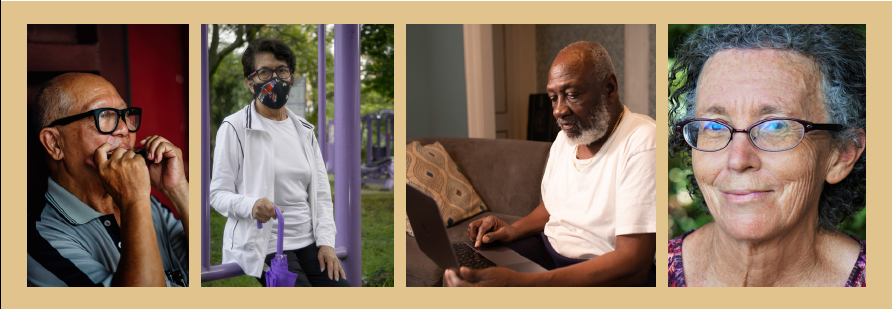This study was funded by the University of Washington Population Health Initiative’s COVID-19 Economic Recovery Research Grant, along with matching funds from the University of Washington School of Public Health, School of Social Work, and School of Medicine, Department of Neurology. The authors thank Nancy Hooyman for reviewing a draft of this report.
October 13, 2020
Caring for Washington’s Older Adults in the COVID-19 Pandemic: Interviews with Organization Leaders About the State of Social and Healthcare Services

Clara Berridge, PhD, MSW
Assistant professor, School of Social Work
Carolyn M. Parsey, PhD
Assistant professor, School of Medicine, Department of Neurology
Maggie Ramirez, PhD, MS, MS
Assistant professor, School of Public Health, Department of Health Services
Callie Freitag, MA
Doctoral student, Evans School of Public Policy & Governance
Ian Johnson, MSW
Doctoral student, School of Social Work
Scott W. Allard, PhD
Daniel J. Evans Endowed Professor of Social Policy, Evans School of Public Policy & Governance
Executive Summary
The COVID-19 pandemic presents significant and costly disruptions to social service and health care systems. Eight in ten deaths from the COVID-19 virus in the U.S. have occurred in people age 65 and older (CDC, 2020). In addition to the mortality risk, the pandemic presents grave health and economic risks by disrupting services to older adults that prevent institutionalization, emergency room visits, and other negative health outcomes. This report examines how the pandemic has affected the operation of social service and healthcare organizations that support Washington’s 1.7 million older adults (60+), including 107,000 people with Alzheimer’s disease and other dementias (State Plan on Aging, 2018).
Drawing on surveys and interviews with 45 senior leaders of social services and health care organizations serving older adults throughout Washington State, this report identifies current challenges confronting service delivery and client care, as well as those that will persist to shape future strategy and planning. Several key findings and themes emerge relevant to policy and practice:
Senior leaders describe rapid declines in the physical and mental health and functioning of their older adult patients and clients as a result of the pandemic. Healthcare providers report that chronic medical conditions are often not being well managed, resulting in significant physical deconditioning, increased frailty, and heightened health risks.
Providers believe that a high number of older adults are not seeking care for existing or new conditions, which will have important downstream effects on the health of older adults. Care organizations are particularly concerned about people living with dementia because they are less active and engaged during the pandemic, leading to increased severity and frequency of delusions as well as worsening behavioral symptoms. Moreover, many vulnerable older adult population sub-groups may be falling through the cracks of Washington’s service systems, including those with low-incomes, those who are living alone or unhoused, Latinx immigrant and migrant older adults, people with limited English proficiency, and tribal elders.
Social isolation creates a “double pandemic” and is believed to exacerbate problems of dementia, depression, suicide risk, and disrupted care. Organization leaders described making inroads to address social isolation during the pandemic but also expect the problems created by isolation to persist for some time. Leaders want to see guidelines evolve from isolating in place to recommending ways to provide safe social interaction.
The pandemic is exacerbating service gaps and leading to caregiver strain in Washington. Demand for aging services during the COVID-19 virus remains steady and is expected to increase over time due to demographic trends and caregiver shortages. Family caregivers now have limited respite options and have to assume additional caregiving responsibilities because of service restrictions due to the pandemic.
A digital divide exists in many parts of Washington State, particularly for older adults of color with low incomes and those in rural communities, where unreliable and costly internet and cell phone services may negate well-intended telemedicine and videoconferencing efforts. Senior leaders report barriers to the use of digital tools and training among the oldest adults and those with sensory disabilities or dementia.
Social service and healthcare organizations serving older adults report urgent fiscal shortfalls and budget crises. Layoffs and furloughs have occurred in many organizations, with senior leaders emphasizing the need for additional public funds to prevent further layoffs and staffing shortages. In addition, organizations need assistance obtaining PPE and purchasing supplies or equipment to accommodate new service realities and to provide nutrition services.
Interviews identify several strategies for addressing the challenges of the pandemic and providing high-quality care to older Washingtonians:
- Organizations leveraged targeted funding, partnerships, and transportation networks to enable delivery and drive through meals on a larger scale than previously possible.
- Some in-person services and programming have been moved to virtual platforms, expanding their reach and capacity.
Virtual support groups and activity-based socialization groups have been particularly successful. - Providing technology skills training to older adults through staff, peers, family members, and targeted tutorials has been effective for some.
- Many organizations provide digital devices, particularly prepaid cell phones.
- Organizations creatively adapted where trial and error showed that non-digital service delivery was needed, such as wellness and reassurance phone calls, care packages with pantry staples, outdoor distanced social events, and pod formation for limited social contact.
- Existing and new partnerships have been leveraged to reach older Washingtonians in their homes. Collaborations formed to meet the crisis, however, could be expanded to better serve immigrants and older adults of color.
It is critical for public agencies and private philanthropy to ensure service providers in the aging network are able to continue supporting the needs of older Washingtonians. These service organizations play an essential role in alleviating loneliness and isolation, meeting nutritional needs, improving health outcomes, and enabling access to health care, long-term services and supports, care transitions, and housing. Current and future reductions in revenues from public and private sources jeopardize the sustainability of these critical organizations, particularly those serving older adult populations on fixed incomes.